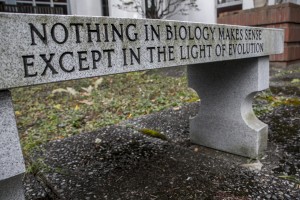SBE Professor Dr. Michael Kinnison featured in Science Magazine
 The study of evolution is not only the study of our past, but also the study of our future. Dr. Michael Kinnison, an applied evolutionary biologist at the University of Maine, believes that many evolutionary principles and applications could provide potential solutions for many major challenges our world faces today. In a paper published in Science Magazine, Kinnison and coauthors explain how applied evolutionary biology can provide strategies to address global challenges that threaten human health, food security, biodiversity, and many other issues that can be anticipated in the future. “So how does applied evolution help solve issues…it helps identify possible costly or disastrous outcomes and it gives tools to both slow the onset of those problems or facilitate new solutions,” said Kinnison.
The study of evolution is not only the study of our past, but also the study of our future. Dr. Michael Kinnison, an applied evolutionary biologist at the University of Maine, believes that many evolutionary principles and applications could provide potential solutions for many major challenges our world faces today. In a paper published in Science Magazine, Kinnison and coauthors explain how applied evolutionary biology can provide strategies to address global challenges that threaten human health, food security, biodiversity, and many other issues that can be anticipated in the future. “So how does applied evolution help solve issues…it helps identify possible costly or disastrous outcomes and it gives tools to both slow the onset of those problems or facilitate new solutions,” said Kinnison.
The idea for the article was conceived at a meeting in Heron Island Australia back in 2010, which was the first meeting to bring together individuals working on applied evolution issues, many of which are addressed in the article.
The major theme of the paper is how evolution is occurring in response to pressures created by humans. “Many species will probably not be able to evolve fast enough to keep pace with global change, which brings about its own set of challenges,” said Kinnison. “The goal of our paper, and applied evolution in general, is to apply evolutionary insights to help slow unwanted evolution or facilitate adaptive potential and match where needed.”
The paper, published online on September 11th, discusses proposed themes to the international sustainable development goals such as the importance of sustainable food security, sustainable sources of water, and universal clean energy.
The next step for the authors is the formation of a Society for Applied Evolution. “This society would build upon our message that scientists, policy makers and practitioners working on challenges in food, health and the environment need to interact more with one another to share solutions and address challenges that span traditional disciplinary boundaries,” explains Kinnison.
